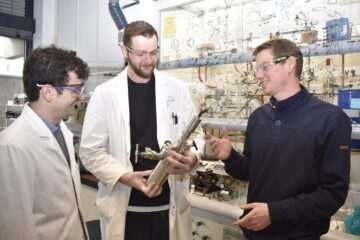Soy protein reduces effects of diabetes on liver

A group of researchers from Mexico has discovered that a diet rich in soy protein may alleviate fatty liver, a disease which often accompanies diabetes. The details of their findings appear in the September issue of the Journal of Lipid Research, an American Society for Biochemistry and Molecular Biology journal.
The high levels of insulin and insulin-resistance that accompany diabetes are often associated with fatty liver or hepatic steatosis, an untreatable condition that can lead to chronic liver disease and death. In this condition, large lipid-filled compartments accumulate in the cells of the liver due to an increase in production of fatty acids in the liver. The end result is an enlarged liver.
Following up research that indicated that eating soy protein reduces lipid production and prevents hyperinsulinemia (the loss of effectiveness of insulin), Dr. Nimbe Torres, of the Instituto Nacional de Ciencias Medicas y Nutricion in Mexico, investigated the effects of a diet high in soy protein on the development of fatty liver associated with diabetes.
Dr. Torres fed Zucker diabetic fatty rats that develop hyperinsulinemia and hepatic steatosis a diet of soy protein for 160 days. She found that the consumption of soy protein prevented the accumulation of triglycerides and cholesterol in the liver despite the development of obesity and hyperinsulinemia in the rats.
“We also observed that the effects of soy protein were due to a low expression of genes involved in the synthesis of fatty acids and triglycerides in the liver,” explained Dr. Torres. “These changes were due to a reduction in the transcription factors that control the expression of genes involved in lipid production.”
In addition, levels of a transcription factor involved in controlling genes involved in fatty acid breakdown, as well as its target genes, were increased in rats fed soy protein. Thus, feeding rats a soy-rich diet reduced the amount of fatty acid in their liver by not only reducing lipid production but also by increasing its breakdown.
Although further research is needed, Dr. Torres believes that consuming soy protein could very well reduce insulin resistance, renal damage, and fatty liver, improving quality of life.
Media Contact
More Information:
http://www.asbmb.orgAll latest news from the category: Life Sciences and Chemistry
Articles and reports from the Life Sciences and chemistry area deal with applied and basic research into modern biology, chemistry and human medicine.
Valuable information can be found on a range of life sciences fields including bacteriology, biochemistry, bionics, bioinformatics, biophysics, biotechnology, genetics, geobotany, human biology, marine biology, microbiology, molecular biology, cellular biology, zoology, bioinorganic chemistry, microchemistry and environmental chemistry.
Newest articles

Lower dose of mpox vaccine is safe
… and generates six-week antibody response equivalent to standard regimen. Study highlights need for defined markers of mpox immunity to inform public health use. A dose-sparing intradermal mpox vaccination regimen…

Efficient, sustainable and cost-effective hybrid energy storage system for modern power grids
EU project HyFlow: Over three years of research, the consortium of the EU project HyFlow has successfully developed a highly efficient, sustainable, and cost-effective hybrid energy storage system (HESS) that…

Safer alternative for an explosive reaction
The chemical industry has been using a reaction with explosive chemicals for over 100 years – now Mülheim scientists have discovered a safer alternative. The Ritter Group of the Max…





















